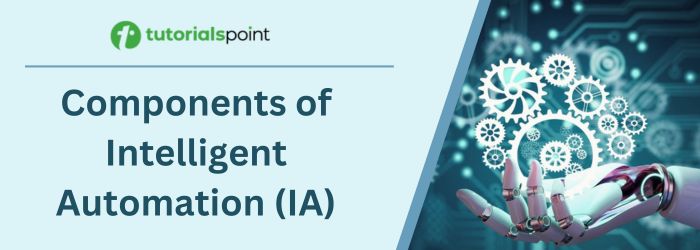
Components of Intelligent Automation
Intelligent Automation comprises of several components to cognitively automate business processes and workflows. This chapter is meant for explaining some of the main components of intelligent automation that help achieve necessary automation functionalities in business operations.

Intelligent Automation Components
The main components of intelligent automation are explained below with their basic introduction and role in intelligent automaton −
Artificial Intelligence (AI)
Artificial Intelligence (AI) is a modern technology that simulates human intelligence in machines. Hence, it makes computers and software capable in handling tasks and processes that require cognitive decision-making.
In intelligent automation, artificial intelligence provides capabilities to handle and automate complex workflows and processes. To solve critical problems and enhance operational efficiency, AI makes combined use of more advanced technologies like machine learning (ML), optical character recognition (OCR), and natural language processing (NLP). Thus, artificial intelligence makes intelligent automation more intelligent by enabling it to learn and improve from data.
AI offers several benefits to intelligent automation, such as speed up automation, adaptive to changes, optimize workflows, provide responses and supports dynamically, etc.
Robotic Process Automation (RPA)
Robotic Process Automation (RPA) is an automation technology used to automate rule-based, repetitive tasks and processes like data entry, invoice processing, report generation, etc.
In intelligent automation, RPA provides necessary functionalities to handle tasks without any human involvement. It mainly acts as a task handler to perform predefined processes within intelligent automation. RPA frees up human workers from low-value, repetitive tasks and improves the efficiency by automating them.
RPA along with AI offers several advantages to intelligent automation, such as –
- Increased operational efficiency
- Reduced human errors
- Reduced time to complete processes
- Free up human workers to be engaged in high-value, strategic tasks, etc.
Business Process Management (BPM)
Business process management is a concept that utilizes tools and technologies to manage, analyze, and optimize processes and workflows in business organizations and achieve higher operational efficiencies in operations.
BPM is a critical component of intelligent automation, as it enables organizations to identify bottlenecks and inefficiencies in processes and streamline workflows.
Being a part of intelligent automation, business process management helps achieving the following key benefits –
- Re-design and optimize workflows
- Enable to adapt to changes
- Improve operational efficiency
- Allows to scale operations
Automation Tools
Automation tools are nothing but software tools and applications designed and used to automate business processes and workflows. These tools also improve functionalities of existing processes and provides seamless communication among various processes and systems across the organization.
The primary functions of automation tools in intelligent automation are to provide data sharing facilities, identifying inefficiencies, and automating tasks across various departments. Hence, automation tools offer the following key benefits to intelligent automation −
- Enhanced interdepartmental collaborations
- Reduced manual efforts
- Automated end-to-end business operations, etc.
The Role of Data in Intelligent Automation
Data is nothing but raw facts and figures obtained from processes and operations in an organization, and it is the foundational component of intelligent automation. In intelligent automation systems, data is used for various purposes like training automation systems, improving performance, developing algorithms, guiding workflows, refining processes, and identifying bottlenecks and inefficiencies, etc.
By performing all these key functions in intelligent automation, data provides the following benefits –
- Enables continuous learning and improvement of automation systems
- Allows for accurate decision-making
- Makes systems adaptable to changes
- Enhances operational efficiency, etc.
Conclusion
In this chapter, we explained the five major components of intelligent automation namely, artificial intelligent (AI), robotic process automation (RPA), business process management (BPM), automation tools, and data.
An advanced intelligent automation system comprises of many other components as well, but these five are critical in any typical IA system. Let's move to the next chapter in this tutorial to learn about Role of Artificial Intelligence (AI) in Intelligent Automation (IA).